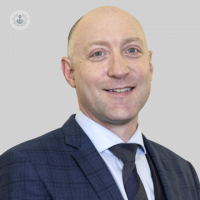What is a robotic radical prostatectomy?
Written by:Top Doctors recently spoke to Professor Greg Shaw, a highly respected consultant urologist. Here, in this article below, he details what a robotic radical prostatectomy is, and how exactly it is performed.

What is a robotic radical prostatectomy?
Robotic radical prostatectomy is a minimally invasive (keyhole) operation, performed by a surgeon using the Da Vinci robot, to remove a cancerous prostate gland. The operation is used to cure prostate cancer which has not spread. After the prostate has been removed, the surgeon reconnects the bladder to the urethra (the urine tube passing through the penis) with a stitch.
What’s involved in the procedure and how long does it take to recover?
The procedure involves a general anaesthetic and an overnight hospital stay. After surgery, patients wear a catheter and take simple painkillers like paracetamol and ibuprofen, for a week or so. Deskwork or working from home can start a few days after surgery, but patients often find their energy levels are low for a few weeks after surgery and they should take some time out to recover
What is quality of life can a patient expect after a robotic radical prostatectomy?
Quality of life is expected to be very good after robotic prostatectomy. In the short term, there are some limitations. Patients can resume normal sporting and leisure activities a month after surgery except for riding a bicycle which should avoided for two months after surgery (the saddle presses on the area of the joint (anastomosis) that is made inside the pelvis and is uncomfortable). In the medium and long term, there should be little or no impact on ability to perform and enjoy the activities that you did before surgery.
How can a robotic radical prostatectomy negatively impact on a patient’s quality of life, and how is this addressed?
The two main issues after robotic prostatectomy are urine leakage and problems with erections. Tailored surgical technique using modifications like NeuroSAFE and nerve and urethral sparing are designed to promote the recovery of sexual and urinary function. Proactive penile rehabilitation under supervision allows patients to resume sexual relations early in their recovery as described above.
Is a robotic procedure more beneficial than a traditional radical prostatectomy?
The recovery rate and risk of complications is so much better with robotic prostatectomy that, in the UK, open surgery is only recommended in those rare cases when robotic surgery is not possible (very obese patients or patients who have had multiple open surgeries on their abdomen where a lot of internal scarring is present). The cancer cure rate is as good with robotic surgery as with a traditional open radical prostatectomy.
What is the survival rate for patients who have had a robotic radical prostatectomy?
The operation of robotic radical prostatectomy is generally safe and major complications are rare (much less than one per cent). With robotic prostatectomy, the chance of curing prostate cancer is very good (around 80 per cent at five years will have no sign of active cancer).
The chance of cure is better for low-risk cancer, but worse for high-risk cancer. The cancer risk is defined by the PSA level, the grade and stage of the tumour. After surgery, the PSA level is checked regularly. The PSA level is expected to drop to very low (“undetectable”) levels and if it starts to rise above 0.2ng/ml, then it gives an early warning that further treatment might be required.
This further treatment is usually with hormones and radiotherapy which gives another chance to cure the cancer. Even if a cancer recurs after radical prostatectomy, the chance of dying from prostate cancer within 10 years is low. This is because, if surgery, or indeed, subsequent radiotherapy, fail to cure the cancer, drug treatments can be used to control the cancer for five to 10 years in almost all cases.
To schedule an appointment with Professor Greg Shaw today, simply head on over to his Top Doctors profile.


